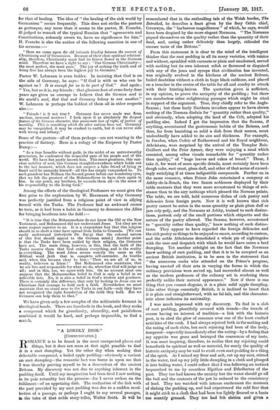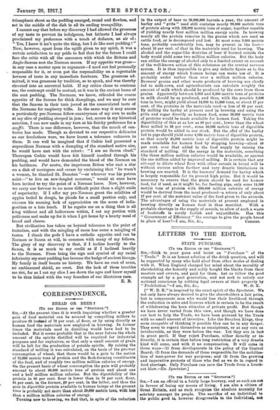R OMANCE is to be found in the most unexpected places
and things, but it does not seem at first sight possible to find it in a suet dumpling. Yet the other day when making that delectable compound, a boiled apple pudding—obviously a variant on suet dumpling—the romantic fact was borne in upon me that I was thereby proving myself to be a descendant of the ancient Britons. My discovery was not due to anything inherent in the pudding itself. Until my imagination had been fired I saw nothing in its pale rotundity but the promise—for I never reckon on the fulfilment—of an appetising dish. The realization of the link with the past provided by my suet pudding was due to a sudden recol- lection of a passage, or perhaps I ought to say several passages, in the tales of that noble story-teller, Walter Scott. It will be remembered that in the enthralling tale of the Welsh border, The Betrothed, he describes a feast given by the fiery Celtic chief, Gwenwyn, the " barbarous magnificence " of which, he says, would have been despised by the more elegant Normans. " The Normans piqued themselves on the quality rather than the quantity of their food, and, eating rather delicately than largely, ridiculed the coarser taste of the Britons."
From this statement it is clear to the mind of the intelligent thinker that the suet pudding in all its many varieties, with raisins and without, sprinkled with currants or plain and unadorned, served with nothing but its own inherent relish or flavoured or disguised with any of the jams and syrups that civilization has invented, was originally evolved in the kitchens of the ancient Britons; boiled doubtless without a cloth in huge black caldrons, and placed on a trencher in the centre of the table for all and sundry to attack with their hunting-knives. The quotation given is sufficient, in my opinion, to prove the antiquity of the pudding ; but there are numberless other enlightening passages which might be cited in support of the argument. True, they chiefly refer to the Anglo- Saxons ; but these burly Northern invaders appear to have shown nothing of the Norman disdain for " quantity rather than quality," and obviously, when adopting the land of the Celt, adopted his pudding also. Indeed I get the impression that the Saxons, if anything, accentuated the gastronomic habits of the Britons, and thus, far from banishing so solid a dish from their menus, must undoubtedly have added to its size and thickness. For example, in Ivanhoe, when Cedric of Rotherwood and his Royal neighbour, Athelstane, were surprised by the arrival of the Templar Bois- Gnilbert and the Prior Aymer, they were enjoying a meal which consisted, among other viands remarkable for " quantity rather than quality," of " huge loaves and cakes of bread." These, I take it, for want of more specific details, must certainly have been dough cake, suet crust, plum duff, and other of that series of exceed- ingly satisfying if at times indigestible compounds. Further on in the same romance, when Prince John entertained a company at Ashby-de-la-Zouch, the two Saxon noblemen displayed by their table manners that they were more accustomed to things of gab- stance than to the airy nothings which pleased the Norman palate. The table, we are told, held numerous dishes of rich pastry and delicacies from foreign parts. Now it is well known that rich pastry cannot be eaten in the same quantity as plain plum duff or jam roly-poly, and the Normans at Ashby, trained to such distinc- tions, partook only of the small portions which etiquette and the nature of the pastry allowed. The Saxons, however, accustomed to " quantity rather than quality," knew nothing of such distinc- tions. They appear to have regarded the foreign delicacies and the rich pastry as things to be enjoyed en masse, according to custom, and the noble Athelstane demolished a whole pie of nightingales with the ease and despatch with which he would have eaten a beef dumpling. Yet another sidelight on the fact that the Normans knew nothing of suet pudding, and that it is to be accepted as an ancient British institution, is to be seen in the statement that " the numerous cooks who attended on the Prince's progress, having exerted all their arts in varying the forms in which the ordinary provisions were served up, had succeeded almost as well as the -modern professors of the culinary art in rendering them perfectly unlike their natural appearance." Now if there is one thing that you cannot disguise, it is a plain solid apple dumpling. Like other things essentially British, it is inclined to boast that it is plain and straightforward, with no fal-lals, and this character. istic alone indicates its nationality.
I was much impressed with my discovery. To find in a slab of suet pudding, plentifully covered with treacle—the treacle of course having no interest of tradition—a link with the historio past, is to shed the glow of romance over one of the leant exalted activities of the cook. I had always rejoiced both in-the making and the eating of such slabs, but such rejoicing had been of the body, tempered—especially immediately after the eating—by a feeling that my appetite was gross and betrayed the coarseness of my taste. It was most inspiring, therefore, to realize that my rejoicing could henceforth be spiritual as well as material, for surely the quality of historic antiquity may be said to exalt even suet pudding to a thing of the spirit. As I mixed my flour and salt, cut up my suet, stirred in the water, tied up my jolly little dumpling in a cloth and plunged it into boiling water, I could reflect that I was following an instinct bequeathed to me by countless Elgithas and Ethelbertas of the past. They too had known the anxiety lest the water should go off the boil and the contents of the pot be reduced to the consistency of lead. They too watched with intense excitement the moment of dishing the pudding up, and had experienced the cold fear that it might stick to a cloth that had been too lightly floured or a basin too scantily greased. They too had felt elation and given a triumphant shout as the pudding emerged, round and flawless, and sat in the middle of the dish in all its waling tranquillity.
I cannot say that before my discovery I had allowed the grossness of my taste to prevent its indulgence, but hitherto I had always
proclaimed my preference with a touch of defiance, an air of :
" Yes, I know it isn't quite the thing, but I do like suet pudding I " Now, however, apart from the uplift given to my spirit, it was a
certain satisfaction to my pride to feel that for the future I could
face the critic with all the assurance with which the Britons and Anglo-Saxons met the Norman sneers. If my appetite was gross—
in any case a matter open to argument—I need not feel personally responsible for it, or even put the responsibility on a regrettable lowness of taste in any immediate forebears. The grossness ad- mitted, it was grossness by tradition, so to speak, and was thereby elevated into an ancestral habit. If my critics chose to contemn ine, the contempt could be mutual, as it was in the ancient home of the suet pudding. The Normans, we know, ridiculed the coarse appetite of the Saxons for thick dumplings, and we may be sure that the Saxons in their turn jeered at the emasculated taste of the Normans for raspberry trifle. In the same way it may amuse
a particularly pro-Norman fellow-countryman of my own to smile at my slice of pudding steeped in jam ; but, secure in my historical
sanction, I can now smile in my turn at his finicky preference for a soufflé. There is one difference, however, that the march of cen- turies has made. Though as devoted to our respective delicacies
as our forefathers were, we have learnt a tolerance unknown to them. It can well be imagined that if Cedric had presented a supercilious Norman with a dumpling of the standard native size,
he would have met with the retort : " I am no Saxon churL" Thereupon Cedric would have felt himself insulted through his pudding, and would have demanded the blood of the Norman on
his battleaxe. Per contra, the impetuous Briton who cast a slur on a dish of meringues and cream by exclaiming that " he wasn't a woman, he thanked St. Dunstan "—or whoever was his patron
saint—" to live on new-fangled nonsense," would at once have
been invited to try the point of a Norman lance. Now, however, we carry our fervour to no more difficult point than a slight smile
of superiority. If I offer my pro-Norman guest the solidities of apples boiled In dough, he pleads for a small portion only, and excuses his seeming lack of appreciation on the score of indis- position or a late lunch. If he regales me on a thing that is all icing without and all hollowness within, I eat my portion with politeness and make up for it when I get home by a hearty meal of bread and cheese.
But civilization has taken us beyond tolerance to the point of imitation, and with the mingling of races has come a mingling of tastes. I thank the gods I have a catholic appetite and can be Norman or Saxon at will, in common with many of my fellows.
The glory of my discovery is that, if I incline heavily to the Saxon, it is as much to my credit as if I inclined heavily to the Norman. From being the sign and symbol of my racial
inferiority my suet pudding has become the badge of ancient lineage.-- My family in itself boasts no history. We have no coat of arms, no emblazoned shield, no crest. But the lack of these troubles me riot, for as I cut my slice I see down the ages and know myself to be thus linked with the very founders of our illustrious race.
E. B.



































 Previous page
Previous page